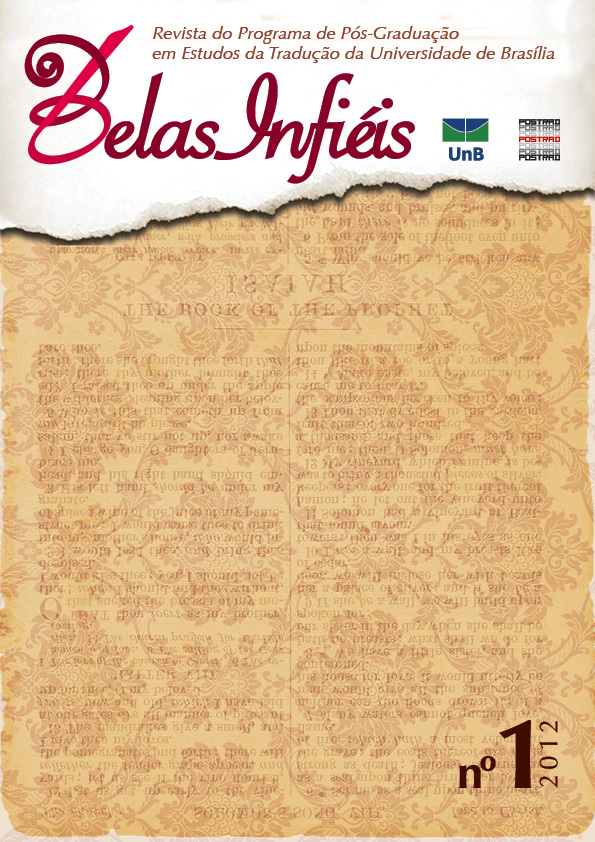HORIZONTES QUE SE FUNDEM:
ABORDAGENS E TEORIAS NA PESQUISA SOBRE TRADUÇÕES DE TEXTOS BUDISTAS
DOI:
https://doi.org/10.26512/belasinfieis.v1.n1.2012.11163Palabras clave:
Estudos da Tradução, Tradução de Textos Religiosos, Tradução de Textos BudistasResumen
Este artigo tem como objetivo realizar uma reflexão da pesquisa sobre tradução de textos budistas, em específico da Índia e Tibete, utilizando-se das abordagens hermenêuticas de Gadamer e Ricoeur, de teoria pós-colonial e de pesquisadores e tradutores de textos budistas no meio acadêmico para que se possa ilustrar as dificuldades e necessidades práticas e teóricas referentes a esse tipo de tradução, apresentando perspectivas, dentro dos estudos da tradução, para a pesquisa de tradução de textos religiosos que vão além do foco sobre teorias voltadas para as traduções da Bíblia e de textos cristãos.
Descargas
Citas
A.F THURMAN. Prefácio.In:LOPES NINA, Ana Cristina.Ventos da Impermanência: um estudo sobre a ressignificação do budismo tibetano no contextoda diáspora.São Paulo: Edusp, 2006.
BRUM, Alberto. A libertação do sofrimento no budismo tibetano Gelugpa.Brasília: Teosófica, 1992.
CABEZÓN, José Ignácio. Comparison as a Principal of Knowledge and its Application to the Translation of Buddhist Texts. In:Buddhist Translations. Problems and Perspectives.Editado por Lama Doboom Tulku.. Delhi: Manohar, 2001.
DELLA SANTINA, Peter. Liberation and Language: The Buddha-Dharma in Translation.In:Buddhist Translations. Problems and Perspectives.Editado por Lama Doboom Tulku.. Delhi: Manohar, 2001.
DOBOOM, Lama Tulku.Buddhist translations ”“problems and perspectives.Delhi: Manohar, 2001.
GADAMER, Hans-Georg. Verdade e método I.Petrópolis: Vozes,1997.
GOHN, Carlos Alberto.Capítulo 6 -Pesquisas em torno de textos sensíveis: os livros sagrados. In: Metodologias de pesquisa em tradução.Editado por Adriana Pagano.Belo Horizonte: UFMG, 2001.
KING, Richard. Orientalism and religion ”“postcolonial theory, India and “The Mystic East”.New York: Routledge, 1999.
NAPPER, Elizabeth. Styles and Principles of Translation. In:Buddhist translations─Problems and perspectives. Editado por Doboom Tulku. Delhi: Manohar, 2001.
NAVARRO LINS, Ricardo Wanderley. Análise descritiva da tradução de termos técnicos do Bhagavad Gita para o Inglês.2009. 240 fls. Dissertação de Mestrado, Programa de Pós-Graduação em Estudos da Tradução, Universidade Federal de Santa Catarina, Florianópolis, Santa Catarina. Disponível em: <http://www.pget.ufsc.br/curso/teses_e_dissertacoes.php/>.Acesso em:1 jun. 2011.
PETERSEN, Oliver. Examples of a Dharma centre’s contribution in the field of translation: study programme and dictionary.In:Buddhist translations ─Problems and perspectives. Editado por Lama Doboom Tulku.. Delhi: Manohar, 2001.
RICŒUR, Paul. Sobre a tradução.Lisboa: Cotovia, 2005.
RIGZIN, Tsepak. Problems and suggestions for making a Tibetan-English Dictionary of Buddhist Terminology. In: Buddhist translations ─Problems and perspectives.Editado por Lama DoboomTulku. Delhi: Manohar, 2001.
SEYFORT RUEGG, D. On translating Tibetan philosophical texts. In: Buddhist translations ─Problems and perspectives.Editado por Lama Doboom Tulku.. Delhi: Manohar, 2001.
SCHLEIERMACHER, Friedrich D.E. On the different methods of translating. In:The translation studies reader. Editado por Lawrence Venuti. New York:Routledge, 2004.
WEININGER, M.J. Resenha de: Bhagavad Gita ”“Canção do Divino Mestre.In: Cadernos de Tradução,Núcleo de Tradução,UFSC, Florianópolis, Santa Catarina, n. 4, 1999.
Descargas
Publicado
Cómo citar
Número
Sección
Licencia
Copyright Statement
Given the public access to this journal, the texts are free to use but requires the recognition of the original authorship and initial publication in this journal to be properly stated.
The journal allows the use of works published for non-commercial purposes, including the right to submit the work to publicly accessible databases. Published contributions are the sole and exclusive responsibility of the author(s).
- When submitting papers to be evaluated by the Belas Infiéis journal, the author(s):
- Declare that the contents of the contributions are original and of their original creation, being entirely responsible for their content if there is an objection by third parties.
- Claim to be aware that they should not commit academic plagiarism.
- Declare that the manuscript has not been published, completely or partially, in Portuguese or another language. If it is a translation it should be submitted to the Translated Articles section.
- Declare that the manuscript is not being evaluated by other journals.
- Declare that the manuscript was not submitted to another journal simultaneously.
- Commit(s) to inform the journal of any kind of error or inaccuracy in their contribution (published, in evaluation or in editing) and to collaborate with the editors to make due corrections of the article (when in evaluation or editing) or erratum/retraction (after publication).
- Declare that there is no conflict of interest regarding the published work.
- Authorize its release if it is accepted for publication without any kind of monetary compensation.
- Agree to assign non-exclusive rights to publication to the magazine, remaining free to make their contribution available in other media as long as the publication of the first version in Belas Infiéis magazine is mentioned. They also authorize Belas Infiéis to assign their texts for reproduction in content indexers, virtual libraries and similar platforms.
- Maintain copyright and grant the journal the right of first publication, the work being licensed under theCreative Commons Attribution License.
- Is/Are allowed and encouraged to publish and distribute their work online after the editorial process, which may increase the impact and citation of the published work.
- Authorize the editorial team to make textual adjustments and to adapt the article to the publication rules, when necessary.



















